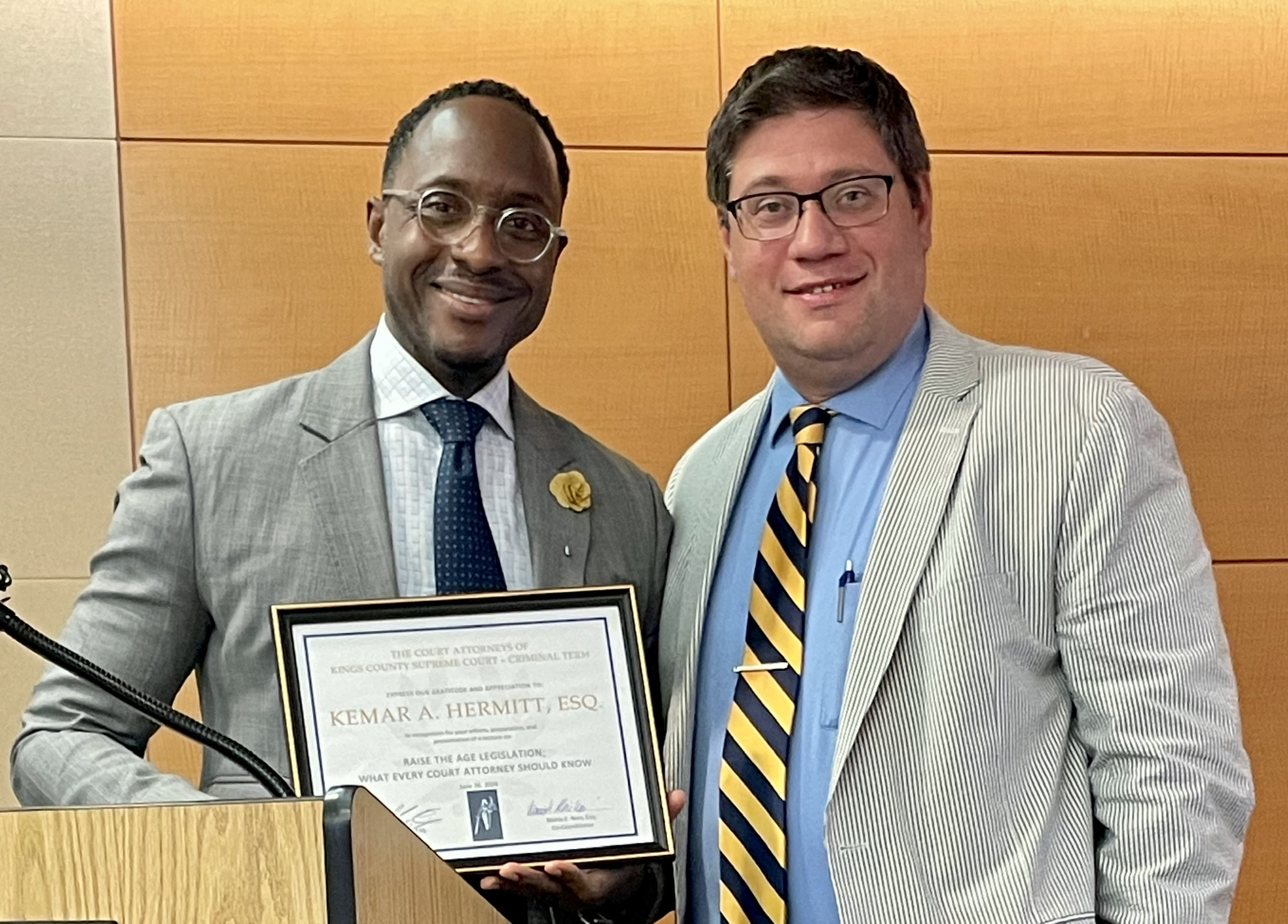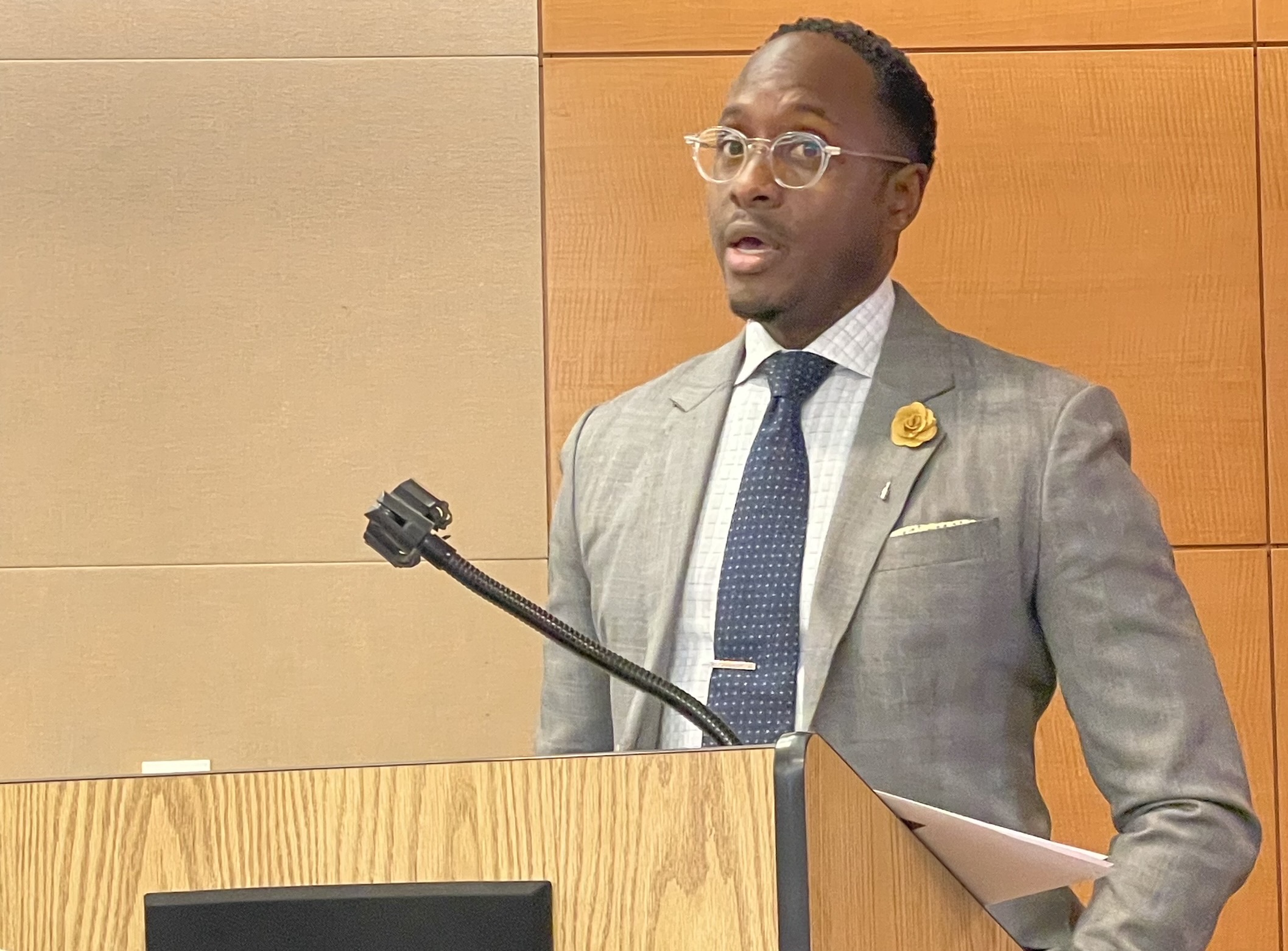Court Attorney Kemar Hermitt explains ‘Raise the Age’ legislation at Supreme Court event

Court Attorney Kemar Hermitt gave a continuing legal education presentation on June 26, 2024, at the Kings County Supreme Court, Criminal Term courthouse. The seminar, titled “Raise the Age Legislation: What Every Court Attorney Should Know,” aimed to give court attorneys a clear understanding of the legislation’s background, reasons, and practical applications.
Hermitt is the principal court attorney to Hon. Craig Walker, a Youth Part Judge at the New York State Supreme Court. With over 11 years of experience, Hermitt has worked in various roles within the New York State Unified Court System, focusing on youth and veteran treatment courts. He is responsible for researching and analyzing legal issues, drafting legal documents, and advising the judge on complex cases. Hermitt holds a J.D. from Cardozo School of Law and a B.A. from Stony Brook University.
Hermitt started his CLE discussion by reviewing the history of juvenile justice in New York, noting that differences between adults and children in the criminal justice system were first acknowledged in the 1820s. The creation of Family Courts in the 1920s and their exclusive jurisdiction over cases involving defendants aged 7-15 in the 1960s were key milestones. Before the Raise the Age (RTA) legislation, individuals 16 and older were tried as adults.
Hermitt explained that raising the age of criminal responsibility was motivated by scientific findings on adolescent brain development, important Supreme Court decisions, and the negative impact of prosecuting juveniles as adults. He highlighted key court cases such as Roper v. Simmons (2005), which banned capital punishment for juveniles, and Miller v. Alabama (2012), which prohibited life without parole for juveniles, even in homicide cases.
Hermitt’s presentation discussed cases where the Supreme Court showed recognition of the developmental differences between juveniles and adults, which explain why legal protections have been tailored to protect the youth — Graham v. Florida and J.D.B. v. North Carolina.

In Graham v. Florida (2010), the Supreme Court ruled that juveniles cannot be sentenced to life without parole for non-homicide offenses, emphasizing the need for the possibility of rehabilitation and second chances for young offenders. J.D.B. v. North Carolina (2011) established that a child’s age must be considered when determining if they are in police custody for Miranda purposes, recognizing that children may feel more pressure to comply with police and may not understand their rights as fully as adults.
The RTA legislation passed in 2017 took effect for 16-year-olds in 2018 and 17-year-olds in 2019. It gave exclusive jurisdiction to the Youth Part for all felony cases involving 16 and 17-year-olds, while non-felony cases are handled by Family Courts or Criminal Courts, depending on the offense.
Hermitt detailed the procedural safeguards established by the RTA legislation, including parental notification requirements, the need for custodial interrogations to be recorded, and the mandate that parents be present during interrogations. He also explained the presumption against bail and detention for youths who are detained in designated Office of Children and Family Services facilities.
The seminar covered the creation of a new category of offenders called Adolescent Offenders (AOs), which includes 16 and 17-year-olds at the time of the offense. AO cases are typically heard in the Youth Part, with nonviolent felony offenses presumptively removable to Family Court unless extraordinary circumstances are proven. Violent felony offenses require a retention hearing to determine if they meet specific criteria for staying in the Youth Part.
A group of court attorneys from the Kings County Supreme Court, Criminal Term, has organized regular monthly meetings starting in 2023. This initiative aims to provide a platform for discussing court-related issues and to facilitate continuing legal education (CLE) sessions. The group’s first official meeting featured a lecture by Hon. Barry Kamins, the former administrative judge of the courthouse, on the Fourth Amendment and recent legal updates.
Since its inception, the group has held quarterly meetings at the Supreme Court, addressing various court issues and fostering professional development among court attorneys. Interested participants can contact Maria Neri or Bill Neri for more information on attending the meetings.

Downtown
View MoreThe Brooklyn Daily Eagle and brooklyneagle.com cover Brooklyn 24/7 online and five days a week in print with the motto, “All Brooklyn All the Time.” With a history dating back to 1841, the Eagle is New York City’s only daily devoted exclusively to Brooklyn.
© 2024 Everything Brooklyn Media
https://brooklyneagle.com/articles/2024/07/02/court-attorney-kemar-hermitt-explains-raise-the-age-legislation/
